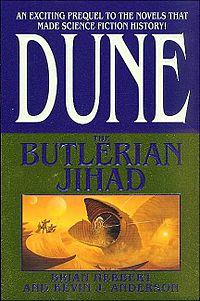


First edition cover
| |
| Authors | Brian Herbert Kevin J. Anderson |
|---|---|
| Audio read by | Scott Brick |
| Cover artist | Stephen Youll |
| Language | English |
| Series | Legends of Dune |
| Genre | Science fiction |
| Publisher | Tor Books |
Publication date | 2002 |
| Publication place | United States |
| Media type | Print (hardback & paperback) |
| Pages | 624 |
| ISBN | 0-7653-0157-1 |
| OCLC | 50192212 |
| 813/.54 21 | |
| LC Class | PS3558.E617 D89 2003 |
| Followed by | Dune: The Machine Crusade |
Dune: The Butlerian Jihad is a 2002 science fiction novel by Brian Herbert and Kevin J. Anderson, set in the fictional Dune universe created by Frank Herbert. It is the first book in the Legends of Dune prequel trilogy, which takes place over 10,000 years before the events of Frank Herbert's celebrated 1965 novel Dune.[1] The series chronicles the fictional Butlerian Jihad, a crusade by the last free humans in the universe against the thinking machines, a violent and dominating force led by the sentient computer Omnius.
Dune: The Butlerian Jihad rose to #7 on The New York Times Best Seller list in its second week of publication.[2]
The novel introduces a generation of characters whose families will later become the most significant in the universe: the Atreides, the Corrinos and the Harkonnens. Serena Butler, daughter of the viceroy of the League of Nobles, is a strong voice for the human rebellion. Her paramour Xavier Harkonnen leads the military force on the current League capital world of Salusa Secundus. As the story begins, Xavier is repelling an attack on the planet by Omnius' army of cymeks. The cymeks are former humans whose brains have been implanted in preservation canisters, which in turn can be installed into a variety of fearsome mechanical bodies, to extend their lives indefinitely and make them nearly unstoppable. The original twenty cymeks (calling themselves the Titans) had conquered the complacent universe by exploiting humanity's reliance and dependency on machines, yet the Titans were later overthrown themselves by Omnius, an artificial intelligence of their design. Seeking to replace human chaos with machine order, Omnius thus ignited the war between machine and humanity. Vorian Atreides is the son and subordinate of the leading cymek Titan Agamemnon (whose last name, Atreides, originates with House Atreus, from the ancient Greek epic the Iliad).
Meanwhile, the Sorceresses of Rossak, a matriarchal order, are perfecting their destructive psychic powers for use against the machines, and maintaining a breeding program to create more powerful telepaths. Pharmaceutical magnate Aurelius Venport is about to discover an interesting new substance, the spice melange, and the famous inventor Tio Holtzman accepts the diminutive genius Norma Cenva into his employ.
Serena is captured by the Titan Barbarossa and put under the watch of Erasmus, an independent robot who seeks to understand humans completely so that the thinking machines may be truly superior. His methods of study often entail human vivisection and torture in his slave pens. Erasmus takes a liking to Serena, as does the young Vorian Atreides. Serena realizes she is pregnant with Xavier's child, and later gives birth to a baby boy whom she names Manion (after her father). Erasmus finds this distraction inconvenient, and not only removes Serena's uterus but kills her young son in front of her.
This single event incites the entire Jihad, and young Manion is soon labelled the first martyr, Manion the Innocent. Vorian, learning about the murder and realizing the lie he lives as a machine trustee, betrays his machine masters and flees with Serena. They are joined by another trustee, Iblis Ginjo, a slave leader who masterminds the rebellion on Synchronized Earth.
The first human victory of the so-called Butlerian Jihad is the destruction of Earth and the Earth Omnius using atomics. Iblis (now Grand Patriarch of the Holy Jihad) and Serena (Priestess of the Jihad) are the religious leaders of the human rebellion, and Xavier and Vorian its two generals. The brutal Titans are desperate to break free of their machine masters and wage their own techno-misanthropic war, and Omnius and Erasmus are determined to conquer and destroy all of humanity once and for all.
A subplot of the novel focuses on the Zensunni slave Ishmael who is captured by slavers and taken to Poitrin. He and a Zenshiite slave named Aliid attempt to sabotage one of Holtzmann's experiments. The two are influenced by the charismatic slave leader Bel Moulay, who inspires a slave uprising. Lord Niko Bludd's Dragoons suppress the revolt. While the slaves receive an amnesty due to the pressing war with Omnius, Moulay is mutilated and executed.
And on a lonely desert planet known as Arrakis, the seeds of legend are sown with Selim Wormrider, an outcast from his tribe, who sees the future of Shai-Hulud and makes it his mission to save his god from those who would wish to take the spice.
Dune: The Butlerian Jihad rose to #7 on The New York Times Best Seller list in its second week of publication.[2]
Since its debut in 1965, Frank Herbert's Dune has sold over 12 million copies worldwide, making it the best-selling science fiction novel of all time ... Frank Herbert's Dune saga is one of the greatest 20th Century contributions to literature.
|
| |||||||
|---|---|---|---|---|---|---|---|
| |||||||
| Star Wars Legends |
| ||||||
| Dune franchise with Brian Herbert |
| ||||||
| Other science fiction |
| ||||||
| Miscellaneous fiction |
| ||||||
| With Doug Beason |
| ||||||
| As Gabriel Mesta |
| ||||||
| Anthology |
| ||||||